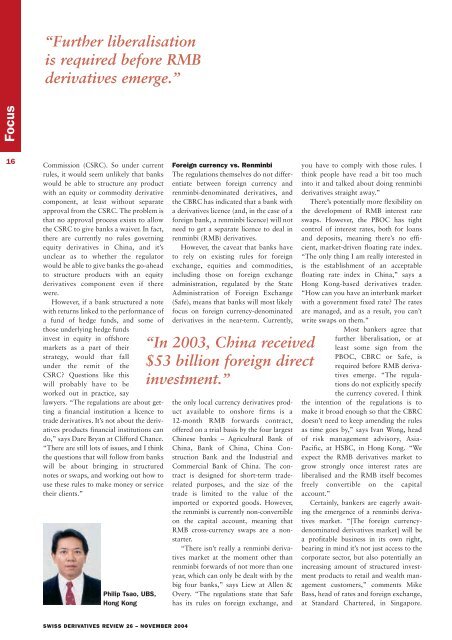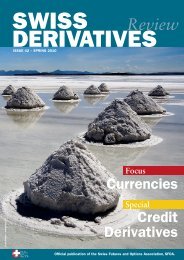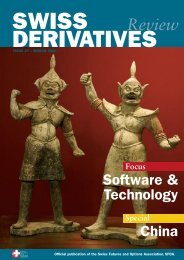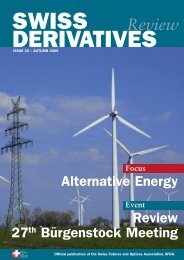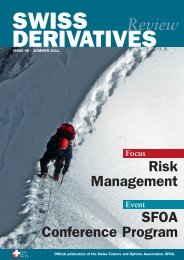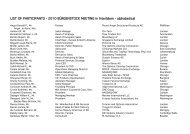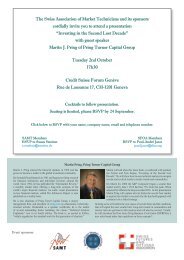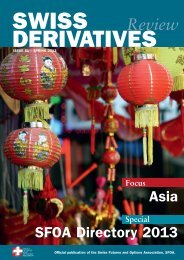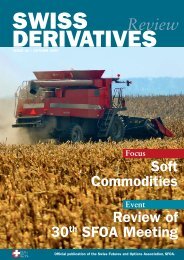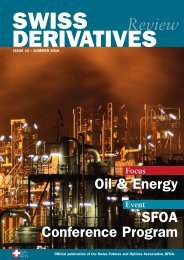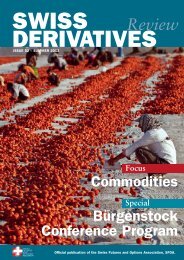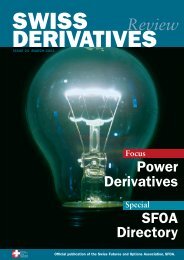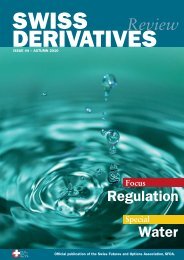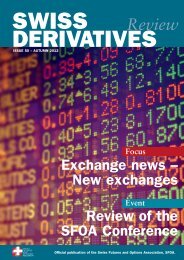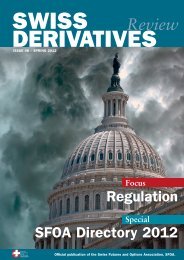Download PDF, Issue 26 - Swiss Futures and Options Association
Download PDF, Issue 26 - Swiss Futures and Options Association
Download PDF, Issue 26 - Swiss Futures and Options Association
Create successful ePaper yourself
Turn your PDF publications into a flip-book with our unique Google optimized e-Paper software.
Focus<br />
“Further liberalisation<br />
is required before RMB<br />
derivatives emerge.”<br />
16<br />
Commission (CSRC). So under current<br />
rules, it would seem unlikely that banks<br />
would be able to structure any product<br />
with an equity or commodity derivative<br />
component, at least without separate<br />
approval from the CSRC. The problem is<br />
that no approval process exists to allow<br />
the CSRC to give banks a waiver. In fact,<br />
there are currently no rules governing<br />
equity derivatives in China, <strong>and</strong> it’s<br />
unclear as to whether the regulator<br />
would be able to give banks the go-ahead<br />
to structure products with an equity<br />
derivatives component even if there<br />
were.<br />
However, if a bank structured a note<br />
with returns linked to the performance of<br />
a fund of hedge funds, <strong>and</strong> some of<br />
those underlying hedge funds<br />
invest in equity in offshore<br />
markets as a part of their<br />
strategy, would that fall<br />
under the remit of the<br />
CSRC? Questions like this<br />
will probably have to be<br />
worked out in practice, say<br />
lawyers. “The regulations are about getting<br />
a financial institution a licence to<br />
trade derivatives. It’s not about the derivatives<br />
products financial institutions can<br />
do,” says Dare Bryan at Clifford Chance.<br />
“There are still lots of issues, <strong>and</strong> I think<br />
the questions that will follow from banks<br />
will be about bringing in structured<br />
notes or swaps, <strong>and</strong> working out how to<br />
use these rules to make money or service<br />
their clients.”<br />
Philip Tsao, UBS,<br />
Hong Kong<br />
Foreign currency vs. Renminbi<br />
The regulations themselves do not differentiate<br />
between foreign currency <strong>and</strong><br />
renminbi-denominated derivatives, <strong>and</strong><br />
the CBRC has indicated that a bank with<br />
a derivatives licence (<strong>and</strong>, in the case of a<br />
foreign bank, a renminbi licence) will not<br />
need to get a separate licence to deal in<br />
renminbi (RMB) derivatives.<br />
However, the caveat that banks have<br />
to rely on existing rules for foreign<br />
exchange, equities <strong>and</strong> commodities,<br />
including those on foreign exchange<br />
administration, regulated by the State<br />
Administration of Foreign Exchange<br />
(Safe), means that banks will most likely<br />
focus on foreign currency-denominated<br />
derivatives in the near-term. Currently,<br />
“In 2003, China received<br />
$53 billion foreign direct<br />
investment.”<br />
the only local currency derivatives product<br />
available to onshore firms is a<br />
12-month RMB forwards contract,<br />
offered on a trial basis by the four largest<br />
Chinese banks – Agricultural Bank of<br />
China, Bank of China, China Construction<br />
Bank <strong>and</strong> the Industrial <strong>and</strong><br />
Commercial Bank of China. The contract<br />
is designed for short-term traderelated<br />
purposes, <strong>and</strong> the size of the<br />
trade is limited to the value of the<br />
imported or exported goods. However,<br />
the renminbi is currently non-convertible<br />
on the capital account, meaning that<br />
RMB cross-currency swaps are a nonstarter.<br />
“There isn’t really a renminbi derivatives<br />
market at the moment other than<br />
renminbi forwards of not more than one<br />
year, which can only be dealt with by the<br />
big four banks,” says Liew at Allen &<br />
Overy. “The regulations state that Safe<br />
has its rules on foreign exchange, <strong>and</strong><br />
you have to comply with those rules. I<br />
think people have read a bit too much<br />
into it <strong>and</strong> talked about doing renminbi<br />
derivatives straight away.”<br />
There’s potentially more flexibility on<br />
the development of RMB interest rate<br />
swaps. However, the PBOC has tight<br />
control of interest rates, both for loans<br />
<strong>and</strong> deposits, meaning there’s no efficient,<br />
market-driven floating rate index.<br />
“The only thing I am really interested in<br />
is the establishment of an acceptable<br />
floating rate index in China,” says a<br />
Hong Kong-based derivatives trader.<br />
“How can you have an interbank market<br />
with a government fixed rate? The rates<br />
are managed, <strong>and</strong> as a result, you can’t<br />
write swaps on them.”<br />
Most bankers agree that<br />
further liberalisation, or at<br />
least some sign from the<br />
PBOC, CBRC or Safe, is<br />
required before RMB derivatives<br />
emerge. “The regulations<br />
do not explicitly specify<br />
the currency covered. I think<br />
the intention of the regulations is to<br />
make it broad enough so that the CBRC<br />
doesn’t need to keep amending the rules<br />
as time goes by,” says Ivan Wong, head<br />
of risk management advisory, Asia-<br />
Pacific, at HSBC, in Hong Kong. “We<br />
expect the RMB derivatives market to<br />
grow strongly once interest rates are<br />
liberalised <strong>and</strong> the RMB itself becomes<br />
freely convertible on the capital<br />
account.”<br />
Certainly, bankers are eagerly awaiting<br />
the emergence of a renminbi derivatives<br />
market. “[The foreign currencydenominated<br />
derivatives market] will be<br />
a profitable business in its own right,<br />
bearing in mind it’s not just access to the<br />
corporate sector, but also potentially an<br />
increasing amount of structured investment<br />
products to retail <strong>and</strong> wealth management<br />
customers,” comments Mike<br />
Bass, head of rates <strong>and</strong> foreign exchange,<br />
at St<strong>and</strong>ard Chartered, in Singapore.<br />
SWISS DERIVATIVES REVIEW <strong>26</strong> – NOVEMBER 2004


